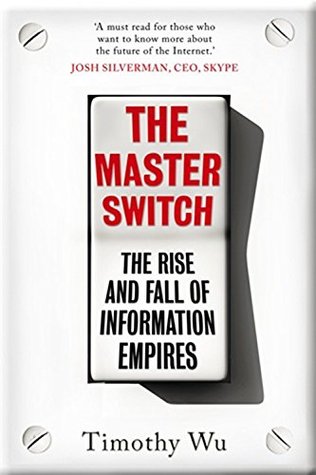More on this book
Community
Kindle Notes & Highlights
Jonathan Zittrain calls a tethered technology: that is, a technology tied directly to its owner, and limited in what it might do.
the new only rarely supplements the old; it usually destroys it. The old, however, doesn’t, as it were, simply give up but rather tries to forestall death or co-opt its usurper—à la Kronos—with important implications.
Thanks to Jay Gould’s blindsiding attack, and good old-fashioned corporate ineptitude on its own part, Western Union broke down and gave up on its imperial plans. Instead of dominating a business it could have bought for $100,000, the company entered into negotiations with Vail, who struck a tough bargain. Western agreed to abandon telephony forever, in exchange for 20 percent of rental income on the Edison telephone and a promise from Bell never to enter the telegraph market or offer competition to the Associated Press. 20
Perhaps it is for this reason that the advent of every new technology of communication always brings with it a hope for ameliorating all the ills of society. The arrival of mass broadcasting inspired, in the United States and around the world, an extraordinary faith in its potential as the benefactor, perhaps even a savior, of mankind.
Lawrence Lessig,
you haven’t a hobby—get one. Ride it. Your interest and zest in life will triple. You will find common ground with others—a joy in getting together, in exchange of ideas—which only hobbyists can know. Wireless is of all hobbies the most interesting. It offers the widest limits, the keenest fascination, either for intense competition with others, near and far, or for quiet study and pure enjoyment in the still night hours as you welcome friendly visitors from the whole wide world.
Whatever he most desires—whether it be opera, concert, or song, sporting news or jazz, the radio telephone will supply it. And with it, he will be lifted to greater appreciation. We can be certain that a new national cultural appreciation will result. . . . The people’s University of the Air will have a greater student body than all of our universities put together.
same logic Microsoft would follow in the 1990s, when its Windows operating system was similarly run as a partially open system. Like AT&T, Microsoft invited its enemies to connect, to take advantage of an open platform, hoping they wouldn’t notice or worry that the platform came with a spring trap.
The big question—now often the multi-billion-dollar question—is how to decide, as a matter of policy, what businesses should be considered common carriers with special duties to the public (as Bell positioned itself ), which companies should be run by government (as the Post Office has been since Franklin founded it), and which should be “ordinary services” left mostly to forces of the free market.*
Injunction suits—let there be injunction suits in large numbers, let them flock in from all quarters, let the federal courts and the state courts buzz with them. Scour the country for infringements, set spies on every independent camera, projecting machine, reel of film, that could be found. Let actions breed and multiply
Economics textbooks portray the harm of monopoly as its tendency to restrict supply and set high prices. But in the case of the Trust, the goal was to make a cheap product, and so the effect was to depress prices—can there be any harm in that? Yes, and in fact this is a case where the greater harm of monopoly reveals itself to be not economic but expressive. The Trust’s rules controlled not just costs, but the very nature of what film, as a creative medium, could be. In an information industry the cost of monopoly must not be measured in dollars alone, but also in its effect on the economy of
...more
It is inconceivable,” said Herbert Hoover, secretary of commerce, at the first national radio conference in 1922, “that we should allow so great a possibility for service, for news, for entertainment, for education, and for vital commercial purposes to be drowned in advertising chatter.”1 Hoover’s remarks reflected the accepted wisdom of the times: that advertising on radio was unacceptable.


